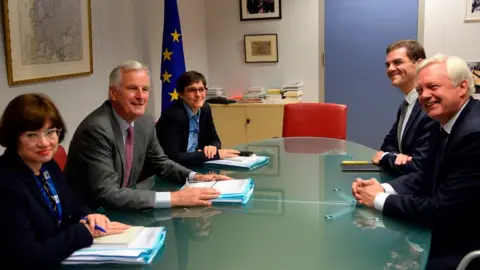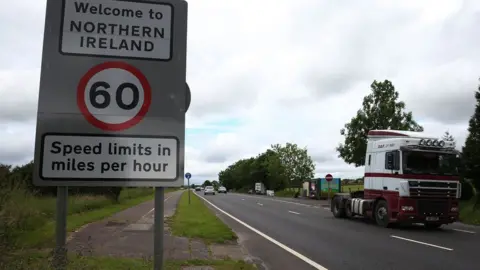Meanwhile in Brussels...

 AFP/Getty
AFP/GettyIf you can tear yourself away from episode 75 of the saga over the government's existent or non-existent Brexit papers, there is something pretty important going on in Brussels as we speak.
It could determine whether or not the prime minister gets her way next month and manages to move on from the purgatory of the first phase of the Brexit talks - relieving, if only temporarily, some of the pressure on her to show that she has even a loose grip on the whole procedure.
The test, which is a ultimately a political judgement, is, as we've discussed here before, whether the negotiations are deemed to have made 'sufficient progress' to move on to discussions about the long-term relationship between the UK and the EU.
So with the mood music suggesting the bill is broadly settled - although there is no final precise agreement - what happens next?
To hammer the over-used divorce metaphor, for eight months they've been arguing over who gets the vinyl collection, the pot plants, and who keeps the house - the next stage is over who gets long-term custody of the kids.
As we've been reporting, none of the three primary areas - money, citizens' rights or Ireland - are yet settled enough for the "sufficient progress" hurdle to be cleared.
But there has been plenty of movement in the first two areas, and it's on number three, the Irish border, that there is still the most distance to travel.
There is though careful choreography being put in place to try to get the summit in the middle of next month to be the magic moment.
So in theory, all the officials and politicians who have been living and breathing this for weeks can collapse with exhaustion for the Christmas holidays. Theresa May can tell her backbenches and the British business community that she is on track, that they can go away and gorge on Christmas pudding and come back and worry about the longer term next year - she hopes.
Here is how it might, just might, work, if the stars align. And if you are not interested in the sausage machine of how EU deals are done, it might be better to look away now. Both sides are discussing now whether the two key officials, Olly Robbins (the PM's top Brexit adviser) on the UK side, and Sabine Weyand (Michel Barnier's deputy) on the EU side can produce a joint paper, what's been described to me as an "agreed truth", before next Monday.
The idea is that the negotiating rivals can come together to formalise what has been agreed so far, to write it down in black and white so that the conclusions of phase one can be closed, signed off, and by implication, not unpicked at a later stage in the future dramas of the second bit of the deal-making.
In the possible scenario that everyone likes it (and I'm not suggesting this is in any way a dead cert) the paper may be published at the end of this week potentially.
The message from negotiators to the rest of the EU - this is where we agree that we have got to, up to you to agree whether, in political terms, that is progress enough.
And remember while the decision to move on or not lies officially with the European Council, the 27 political leaders, they will act on the basis of what's recommended by their negotiating team.
So if the joint paper does emerge, it will be a big hint that moving on is nigh. One Brussels source suggests however that it is just "one of the options" and there is a "lot of work to do" before that document can be agreed, let alone come blinking into the glare of the public domain.
I'm told that officials are discussing precisely this over the next few days.
If that happens though, it's possible that the Brexit Secretary David Davis will also make the journey to Brussels next Monday and potentially give a press conference alongside Michel Barnier, declaring the conclusions of both sides at this critical junction - with the prime minister expected to follow for lunch or more likely dinner with the president of the Commission, Jean Claude Juncker that day too.
Sources suggest these steps are vital so both sides "know where we stand" before the political preparation to get the EU leaders to sign on the dotted line at the summit in the middle of next month. Nothing is fixed about these scenarios but both sides agree that next Monday looks like being a critical day.
The next step in this vital choreography is expected then to be a meeting of EU ambassadors and the leaders' 'sherpas', their senior officials, on 6 December, again in Brussels.
From then on the discussion moves to drafting the actual conclusions that Theresa May and her counterparts can agree. And if, if, that all goes well, (the further on in the process, the bigger the 'IF' becomes), then the agreement could be ready to go for a relatively smooth discussion when the leaders sit down together on 14 December. Maybe.
Nothing about this is definite. There are still things to be resolved and pressure particularly on the UK to find a form of words that gives more concrete commitment on its ambitions to keep the Irish border as free as possible.
It's not clear this will be enough.
 PA
PAOne source on this side of the Channel told me "we can't do more than be as reassuring as we can". But in Brussels the whole situation is still described as "very difficult", saying "it's not just about a few cameras in a few trees, it's a much more serious political issue than that".
But what the UK hopes for is enough progress in the next vital few days to get a straightforward green light to move on to the next phase.
If not, there is, it's suggested in London, a middle ground where progress on citizens' rights and the money are agreed, with Ireland to be settled at a later date - although a bucket of freezing water was thrown over that by others in the EU where I'm told there has been no real discussion of such a halfway marker.
Or, it's still possible that there is an almighty bust up. There are plenty of unresolved issues that could trip things up - an Irish veto over the UK position on the border; what happens to child benefit for EU citizens in Britain; a failure to agree more on the role of the European court, or the EU presses Theresa May too hard on the money.
There could yet be a falling out over her desire to make the financial settlement conditional on trade and transition, what could be yet, in the words of an EU source "a deal breaker for the 27".
If it's all off in December, well who knows. The prime minister could end up with what feels like a political crisis - Eurosceptics pushing her in one direction to walk away from the talks, and an equal and opposite force in the other direction, the business lobby pulling her hard to get back to the table immediately.
The prospect of that clash perhaps makes the ongoing mess over the mysterious Brexit papers that either do, or don't, really exist feel like a walk in the park.
